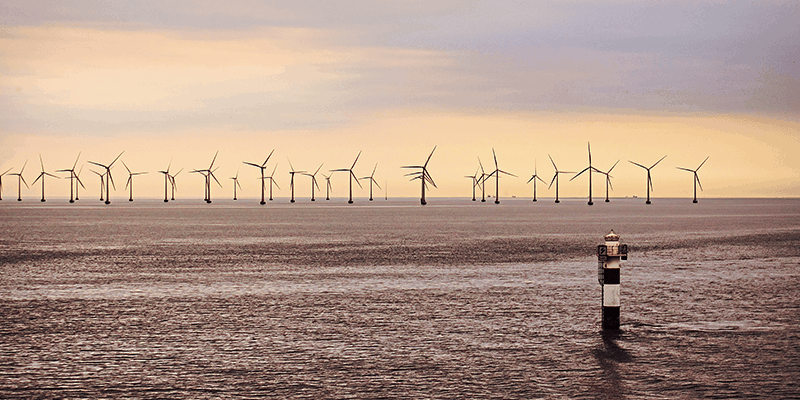Renewables and energy projects are often held back by common data challenges. Sandra Merten argues that implementing data-first practices will enable organisations to repurpose existing supply chains and infrastructure more effectively and meet sustainable development goals

The global transition to renewable energy gains momentum every day, driven by shifting consumer preferences, fiscal support by governments and corporate investments in net-zero strategies. Renewables, grids and storage now account for more than 80% of total power sector investment. Oceans are an abundant source of renewable energy, and as such, offshore wind, solar and emerging ocean technologies will play a huge role in decarbonising the energy sector. The International Renewable Energy Agency (IRENA) predicts offshore wind will increase more than tenfold from 34GW in 2020 to reach 380GW by 2030, and more than 2,000GW by 2050. Offshore renewables will extend beyond just energy – IRENA notes applications in shipping, water desalination, aquaculture, and even socio-economic benefits such as job development for island states.
Yet, screening and developing new offshore sites presents a challenge for companies. Offshore sites are often in environmentally extreme locations with limited supply chains and connectivity, which IRENA notes corresponds to high capital costs and risk. Compounding this is the lack of regulatory frameworks and national policies for developing new sites, which impacts public and investor opinion in these technologies.
To make confident decisions about the viability of potential sites, data-led decision-making is critical. As such, energy companies need access to as much information as possible, including geospatial, geotechnical and geoscientific data, to ensure energy investments deliver results and minimise risk.
Three data dilemmas
When identifying and assessing potential offshore sites, project teams need geospatial intelligence on a broad range of factors. These include regional geology, bathymetry, shallow seismic data, seabed mobility and obstructions, and meteorological data. It is also important to be aware of existing infrastructure, transport viability and environmental impact.
This information enables companies to make more informed and confident decisions about the feasibility of renewables sites. However, at present, three data challenges are standing in the way of success:
Volume and velocity
Between 2001 and 2020, the number of research publications related to clean energy, net-zero energy and renewables grew rapidly to 1.6 million. With new data constantly being produced, geoscientists and engineers find it difficult to keep up. Discovering and aggregating large and increasing volumes of data is a time-consuming and arduous process. Geoscientists and geoengineers spend up to 80% of their time searching for and formatting geoscience information and data, leaving limited time for analysis and interpretation. This increases the risk of overlooking important information and project delays. Without embracing digital technology, researchers risk being left behind.
Accessibility and interoperability
Despite the available volume, many geoscientists and engineers struggle to access the information they need for energy transition projects because data is often locked away in silos. Energy companies produce considerable amounts of data in both structured and unstructured formats – for example, maps, well logs, photos, seismic profiles and stratigraphic columns. This information can be scattered across different pockets throughout the organisation and may not be easily accessible by other departments.
At the same time, companies use much external third-party data, including published literature, to inform projects. Harmonising different sources of data – proprietary and external – for accurate analysis presents yet another challenge because datasets may not be interoperable.
Usability
Compounding these issues is poor usability of existing digital solutions. Often, geoscientists and engineers resort to manually reviewing and refining internet searches to find data about specific locations. If they spell the name of the location incorrectly or if it appears in the original document in a different language or abbreviated, it may not be found in the search.
Geoscientists need user-friendly access to geospatial intelligence through specialist tools built for their sector. Consumer search engines are not good enough – researchers need the ability to precisely associate data with a particular location, and to conduct analyses and interpretations of that data. Domain-specific solutions that facilitate intuitive in-depth analyses are an essential component of overcoming this particular challenge.
A data-led transition
Energy companies that are serious about transitioning to renewables should also be serious about upgrading their management of data. Robust data management is essential in supporting the industry to manage risk and strengthen data-driven strategic decision-making. As the volume of data continues to increase, digital and data transformation becomes more pressing, to harness the insights that are held within the data. Unlocking the value of data with better practices alongside the adoption of specialised user-friendly digital tools will accelerate projects and bring organisations closer to their overall renewable energy goals.
For example, data silos can be broken down with technologies to aggregate, enrich, standardise and structure data from multiple origins, including internal and legacy data, and external and third-party sources. These include the use of taxonomies and semantic technologies, such as natural language processing, machine learning and geotagging. Additionally, site-specific search and refinement options are important to ensure that geoscientists and engineers get the most relevant results when looking for data.
Many companies are also increasingly looking to projects that encourage shared data standards – for example, The Open Group OSDU Forum – that allow for the movement of data between organisations; with an ecosystem that is centred around interoperability, the impact of data siloes is lessened.
To support energy-transition initiatives, such as identifying optimal sites for developing offshore wind farms, researchers need seamless access to data to drive decision-making, reduce costs and minimise the impact on the environment. Improved applications of data will accelerate offshore renewables project timelines, and help companies achieve an energy transition that is sustainable, secure, and supportive of economic growth.
With data-first practices, organisations can more effectively repurpose existing supply chains and infrastructure, meet sustainable development goals and empower geoscientists and engineers to do what they do best, rather than “wrangling” data.
Dr Sandra Merten is senior product manager at Elsevier


